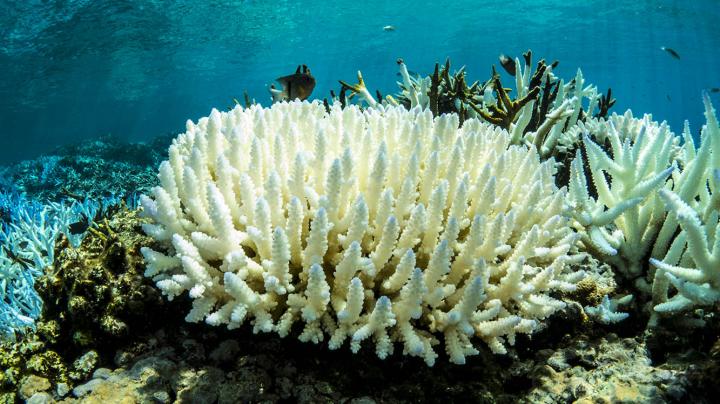Climate engineering may save coral reefs, study shows

Current coral bleaching in Fiji. Credit: Professor Peter J Mumby, University of Queensland
Coral reefs are considered one of the most vulnerable ecosystems to future climate change due to rising sea surface temperatures and ocean acidification, which is caused by higher atmospheric levels of carbon dioxide.
Mass coral bleaching, which can lead to coral mortality, is predicted to occur far more frequently over the coming decades, due to the stress exerted by higher seawater temperatures.
Scientists believe that, even under the most ambitious future CO2 reduction scenarios, widespread and severe coral bleaching and degradation will occur by the middle of this century.
The collaborative new research, which includes authors from the Carnegie Institution for Science, the University of Exeter, the Met Office Hadley Centre and the University of Queensland, suggest that a geoengineering technique called Solar Radiation Management (SRM) reduces the risk of global severe bleaching.
The SRM method involves injecting gas into the stratosphere, forming microscopic particles which reflect some of the sun's energy and so help limit rising sea surface temperatures.
The study compared a hypothetical SRM geoengineering scenario to the most aggressive future CO2 reduction strategy considered by the Intergovernmental Panel on Climate Change (IPCC), and found that coral reefs fared much better under geoengineering despite increasing ocean acidification.
The pioneering international study is published in leading scientific journal, Nature Climate Change.
Lead author Dr Lester Kwiatkowski of the Carnegie Institution for Science said “Our work highlights the sort of climate scenarios that now need to be considered if the protection of coral reefs is a priority”.
Dr Paul Halloran, from the Geography department of the University of Exeter added: “The study shows that the benefit of SRM over a conventional CO2 reduction scenario is dependent on the sensitivity of future thermal bleaching thresholds to changes in seawater acidity.
This emphasises the need to better characterise how warming and ocean acidification may interact to influence coral bleaching over the 21st century.”
Professor Peter Cox, co-author of the research and from the University of Exeter said: “Coral reefs face a dire situation regardless of how intensively society decarbonises the economy. In reality there is no direct choice between conventional mitigation and climate engineering but this study shows that we need to either accept that the loss of a large percentage of the world's reefs is inevitable or start thinking beyond conventional mitigation of CO2 emissions.”
This work shows the very different impacts on coral bleaching of different measures to tackle climate change. These different techniques will also have different effects on other impacts such as regional crop growth or water availability.
Media Contact
All latest news from the category: Earth Sciences
Earth Sciences (also referred to as Geosciences), which deals with basic issues surrounding our planet, plays a vital role in the area of energy and raw materials supply.
Earth Sciences comprises subjects such as geology, geography, geological informatics, paleontology, mineralogy, petrography, crystallography, geophysics, geodesy, glaciology, cartography, photogrammetry, meteorology and seismology, early-warning systems, earthquake research and polar research.
Newest articles

Properties of new materials for microchips
… can now be measured well. Reseachers of Delft University of Technology demonstrated measuring performance properties of ultrathin silicon membranes. Making ever smaller and more powerful chips requires new ultrathin…

Floating solar’s potential
… to support sustainable development by addressing climate, water, and energy goals holistically. A new study published this week in Nature Energy raises the potential for floating solar photovoltaics (FPV)…

Skyrmions move at record speeds
… a step towards the computing of the future. An international research team led by scientists from the CNRS1 has discovered that the magnetic nanobubbles2 known as skyrmions can be…




















